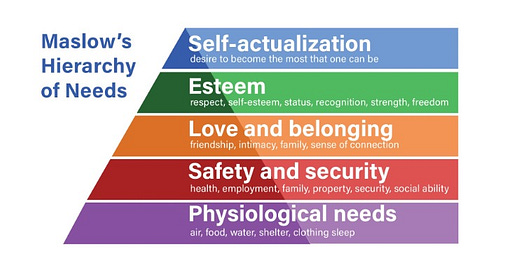Abraham Maslow was an American-psychologist perhaps best known for creating The Hierarchy of Needs (1943). Maslow’s theory of psychological health was based on the belief that individuals need to fulfill innate human needs in succession in order to achieve self-actualization.
At its base, Maslow’s pyramid situates physiological needs like air, food, water, shelter, clothing and sleep. The absolute basics needed for human existence.
Next is, safety and security in the forms of health, employment, family, property, security and social ability.
Then, there’s love and belonging which encompasses friendship, intimacy, family and sense of connection or belonging in your community.
Esteem involves respect, self-esteem, status, recognition, strength and freedom.
The peak of the pyramid, and ultimate goal, is self-actualization or the desire to become the most that one can be.
My guest on Small Change today is Sherrie Sweeney, a member of Basic Income Waterloo Region. Sweeney recently wrote an article arguing for a Guaranteed Livable Basic Income (GLBI). Sweeney based her argument on the premise that people living precariously on minimum wage or Ontario Works (OW), Ontario Disability Support Program (ODSP) payments, Employment Insurance (EI) or Workplace Safety and Insurance Board (WSIB) payments cannot fulfill their basic needs for housing and food and that, in turn, makes it impossible for these folks to be successful candidates when undertaking a job search.
Yet, that’s exactly what the Ford government and many members of society expect those living below the poverty line to do -- to raise themselves up by their bootstraps and find a good paying job in an economic climate that fosters short contracts, no benefits or sick days and no job security regardless of whether the employer is private or public sector.
Sweeney worked for Bridging Employment Supports/Links to Work as a job coach and then an intake coordinator. She worked with people who had a difficult time finding, and keeping, paid employment.
Most of the funding came from the provincial Ministry of Training, Colleges and Universities.
However, soon after Sweeney retired, she found out that the Ford government was closing the program and contracting out local Employment Ontario services to an international for-profit corporation based in the United Kingdom known as SERCO.
SERCO is responsible for prisons, detention centres as well as hospitals in Australia; prisons, defence, citizen services, transport and digital solutions in the US; and pretty much everything in Britain including public housing and the National Health Service.
Currently, SERCO holds a ten-year, $114 million contract with the Ministry of Transportation of Ontario to operate Ontario's DriveTest driver examination centres. These tests include vision, road, and knowledge tests for everyone wanting to become a licensed automobile driver in the province
SERCO was also among the tenders considered by the Ford government to privatize OW and ODSP for the province. That poverty reduction strategy, which is tantamount to social murder, was eventually outsourced to Virginia-based firm Maximus.
According to the SERCO website, Serco Canada has over 1,200 people across 100 offices in four provinces: Newfoundland and Labrador, Ontario, Saskatchewan, and British Columbia. Serco Canada supports federal and provincial governments with a range of services that include defence, ship design, licensing, staffing, air traffic control and space initiatives. Serco Canada is part of Serco North America, a division of Serco Group, a public limited company and global company that has more than 50,000 employees around the world.
Sweeney and I discuss what outsourcing Employment Ontario Services to SERCO will mean for the folks that Sweeney worked with and for the future of the program in general.
Circling back to Maslow and a GLBI, Sweeney explains why she would rather have her tax dollars fund a GLBI than be distributed to shareholders through a multinational corporation.
After hearing Sweeney’s argument, that’s something I think most Ontarians, and Canadians, can all agree on.
The University of Ottawa is proud to co-host BIG: The Forum, May 23 – 26, 2024. Basic Income Guarantee (BIG) can play a significant role in addressing income insecurity and its impact on health, housing, affordability, employment, and more.
The conference will feature speakers from across Canada, including:
Yves-Marie Abraham • Evelyn Forget • Ugo Gentilini • Josephine Grey • Rabia Khedr • Dr. Danielle Martin • Dr. Kwame McKenzie • Qajaq Robinson • Jim Stanford • Paul Taylor • Jessica Topfer
To find out more, please click here.
Music: Real Estate by UNIVERSFIELD is licensed under a Attribution 4.0 International License. freemusicarchive.org.
*Be sure to download the Substack app to get the most from your podcast experience.













Share this post